
Moradabad (Uttar Pradesh): A dingy lane in Moradabad’s Eidgah becomes a platform for raging political discussions every night after 8 pm. A group of men, young and old, gather at the Badi Masjid mohalla after their work for the day is done. They direct the chaiwala to prepare 15-20 cups of tea. A few burkha-clad women also join the gathering from time to time.
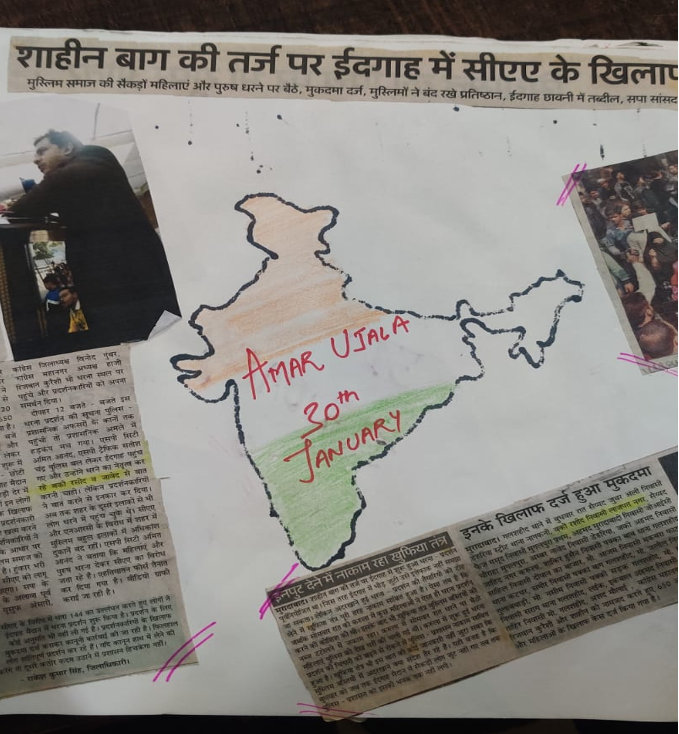
Inspired by the anti-CAA protests in Shaheen Bagh, Moradabad also started a protest against the CAA. Photo: Ismat Ara/The Wire
The tradition started in the winter of 2019, when the elderly and responsible people of the Muslim community started meeting to discuss strategies to keep the anti-Citizenship (Amendment) Act protest going.
However, despite the anti-CAA protests no longer being in the picture, the group continues to meet. The discussion has shifted to the overall situation of minorities in the country. The upcoming Uttar Pradesh elections in 2022 are a hot topic in these tea-time discussions.
One elderly man in the group tells the chaiwala, “Jaise jaise log aate hain, tum chai laate jaana (As more and more people join, keep getting tea).” He replies, “Haan haan, pata hai (Yes yes, I know).”
From lanes going into even smaller lanes, probably the smallest possible lanes, emerge more people – students, children, middle-aged men and the elderly. The only light is coming from a bulb attached to a building in the back. An electric pole stands in the middle of the lane.
As the chaiwala, a young man, pours in measured amounts and milk and water to start making tea, the group starts with their discussions. The baithak talks about the recent farm protests, after which the prime minister decided to withdraw the contentious farm laws.
Ronaq Khan, a young Muslim woman from the area, says that one of the main reasons that the farmers’ protest succeeded was because Muslim women had set an example of non-violence in the anti-CAA and National Register of Citizens protests.
“Muslim women showed the way to all upcoming protests, and set an example of non-violence and determination. If the anti-CAA/NRC as well as the farmers’ protest hadn’t taken place, half the country would have been sold by the BJP by now,” she says.
“Yet, the government did not take back the CAA. The government gave a clear message to the Muslim community that their demands will not be met,” she adds.
Khan is a new entrant in politics, and joined the Rashtriya Lok Dal (RLD) as Moradabad district president six months ago. She is among those who joined politics after participating in the anti-CAA protests.
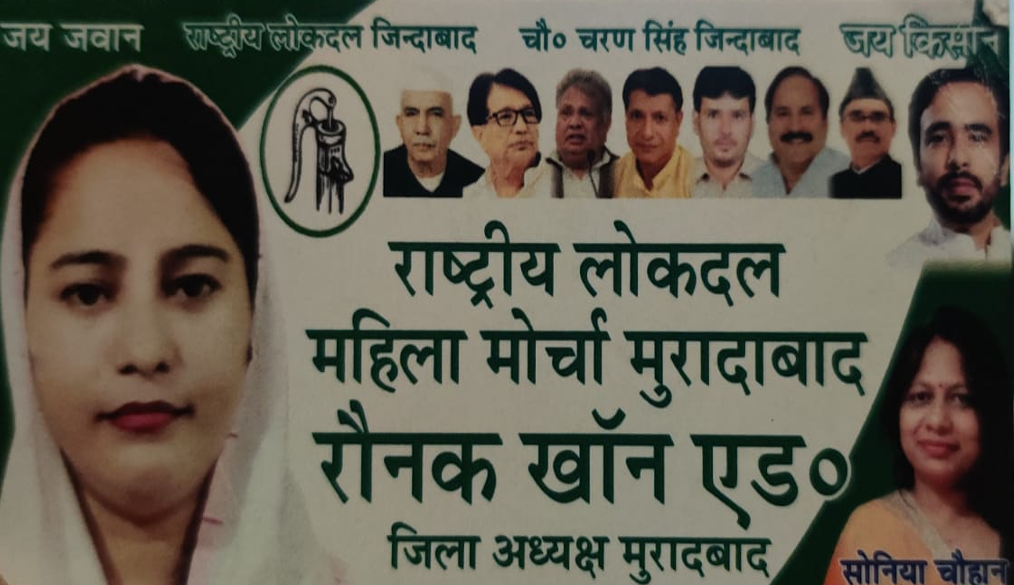
Ronaq Khan carries her visiting card with pride. Photo: Ismat Ara/The Wire
Another such person is Waqi Rasheed, an advocate. He joined active politics after leading the non-violent anti-CAA protests in Moradabad. He is now the city president of the All India Majlis-e-Ittehad-ul-Muslimeen (AIMIM).
AIMIM’s entry into UP politics is often a topic of discussion in the baithaks these days, Rasheed says.
Moradabad has close to 47% Muslims and is considered a stronghold of the Samajwadi Party (SP). Four out of six MLAs in the district are from the SP. The other two are from the BJP.
AIMIM chief Asaduddin Owaisi’s announcement to contest over 100 seats in the state in the upcoming elections has also stirred conversation.
Muslim representation and leadership
In light of the recent rallies held by in Moradabad, some say that Owaisi is addressing what is most needed in the current times – the demand for Muslim leadership and more representation in Indian politics. The two rallies held there have also made evident that AIMIM hopes to win votes in the district.
The general sentiment is that the AIMIM is not being opposed, but needs to have local-level leaders as Owaisi himself is an outsider in UP politics. Rasheed, in a later conversation, told The Wire that the party is already in the process of finding talented faces.
Rasheed says that the SP’s charm in Moradabad district is wearing off, because of the perception that the party leadership is not supporting senior SP leader Azam Khan, currently lodged in a UP jail over multiple charges.
“People’s faith in the SP is decreasing because they can see that no one in the party is raising their voice for Azam Khan. Even in this age of social media, he is left alone to suffer. The SP no longer should take Muslim votes for granted, as they have done in the past,” he says.
For many in Moradabad, adjoining district Rampur’s Azam Khan represents the organic Muslim leadership in the area.
Mohammad Suhail, actively involved in local-level politics as a member of SP, says that Azam Khan is being punished because he gave Muslim children a university and pens to write with, referring to Rampur’s Mohammad Ali Jauhar University. He vaguely echoes Rasheed’s sentiment and says that Azam Khan’s loyalty has not been respected in the party.
Rasheed further says that Muslims are always expected to vote in blocks. “We are now reduced to just a vote bank, and are constantly manipulated by many parties,” he says. Referring to the rally held by Congress general secretary Priyanka Gandhi Vadra in Moradabad on Thursday, he says that this is preparation for the 2024 Lok Sabha elections.
One of the men sitting in the gathering states that the candidate is of utmost importance to Moradabad’s people. Referring to the previous MLA from Moradabad Nagar, Sandeep Agarwal, he said, “RSS se jude hone ke bawajood Musalmano ne unko jitane ke liye tan man laga diya tha, sirf isliye kyunki wo humare mudde samajhte the (Even though he was linked to the RSS, Muslims put their blood and sweat into making him win, because he understood our issues).”
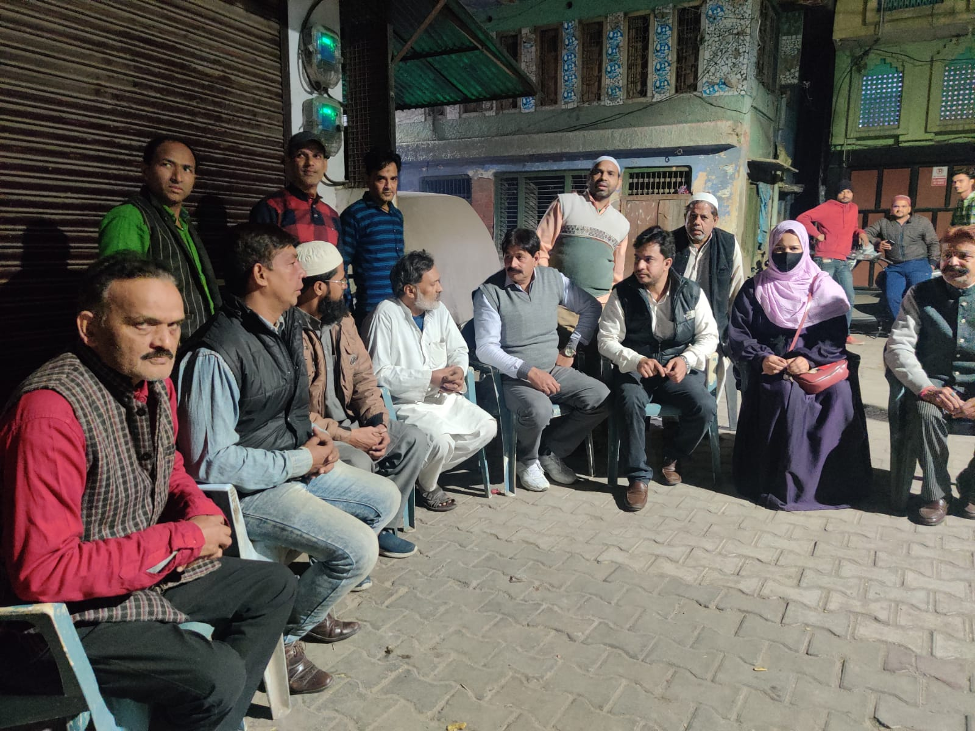
Most of these men are artisans and workers in the brass industry. Photo: Ismat Ara/The Wire
Agarwal was a four-time MLA from Moradabad, thrice from the BJP and once from the SP. The current MLA, BJP’s Ritesh Gupta, is not as active, people say.
There is a sense of anti-incumbency against him. This opens up space for fresh leaders as there is a huge demand and acceptance of Muslim leadership in the district.
Ghanim Mian, an elderly resident of Moradabad’s Nawabpura, is also part of this baithak. Mian is among those who has acted as a mediator between people and the state authorities on several occasions and runs a workers’ association in Moradabad, named Fair Trade Primary Producers’ Association.
He believes that just targeting Muslim votes will not be enough for AIMIM. Rasheed, replying to him, says, “AIMIM may not be able to make the government, but it may be able to give Muslim representation. The primary goal is to have enough representation in the assembly so issues of the Muslim community can be addressed.”
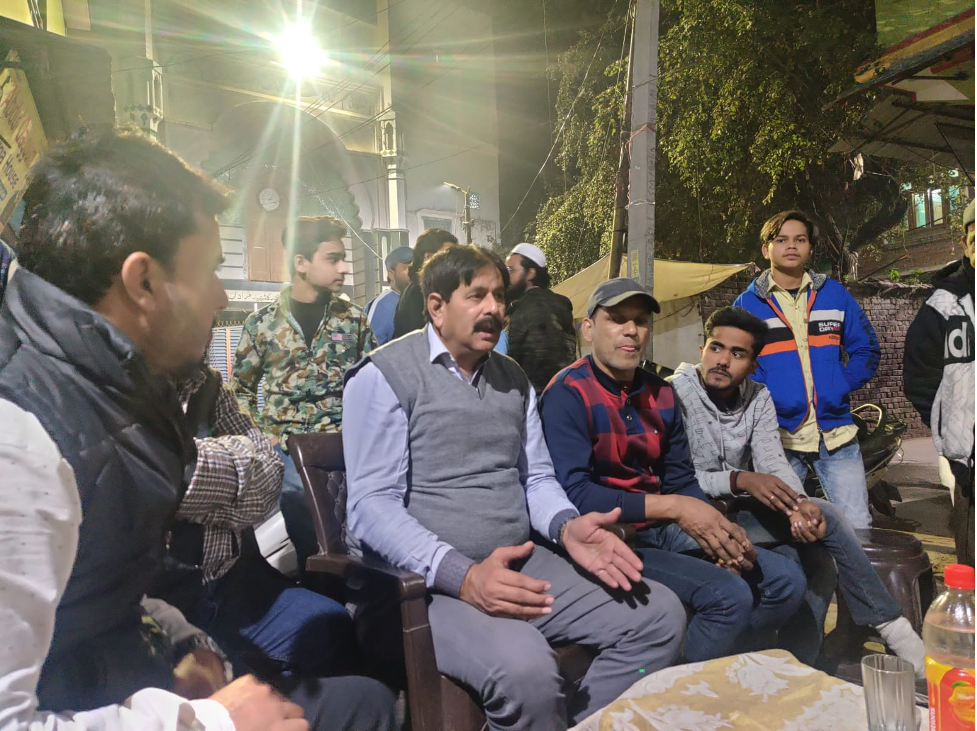
Youngsters also participate in the baithak by listening. Photo: Ismat Ara/The Wire
Homes turned into factories, karigar into mazdoor
Mohammad Noman Mansoori is a 40-year-old entrepreneur who deals in handicraft items such as ingredients for puja and gifting items. Besides domestic sales, he also exports articles abroad. Moradabad, also known as Peetal ki Nagri (brass city) is famous for brass handicrafts.
Hundreds of artisans work under Mansoori, and he says that their lives are increasingly getting more and more difficult. With COVID-19 lockdowns and their impact on exports, the conditions have become even more dire.
“More than three lakh people here are directly engaged in brass work. The brass work industry is in perpetual decline because of issues such as the city pollution department’s constant complaints of noise pollution and lack of industrial area,” he said.
The Wire visited Moradabad’s Islam Nagar area in Karula, once famous for its fine craftsmanship, where tiny one-room houses now double up as industrial units.
The workers are required to be in extreme heat for melting the metal, which can be hazardous in a residential area.
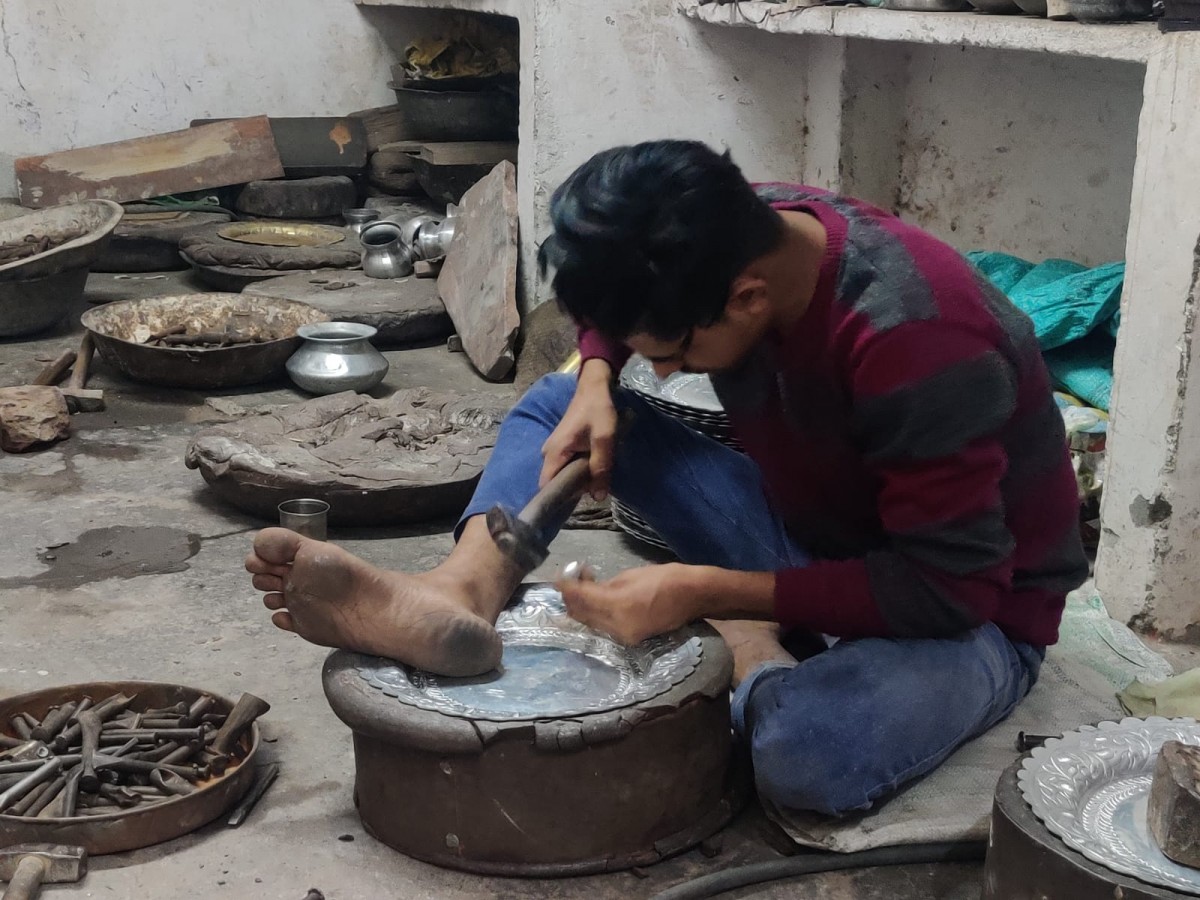
A brass worker in Moradabad. Photo: Ismat Ara/The Wire
Smriti Irani, then the textile minister, on her one-day visit to Moradabad in 2016 had assured the craftsmen and artisans of better facilities, but workers’ in the brass industry are still living in dire conditions and struggling to make ends meet. Many of them had to withdraw their children from schools due to lack of funds after COVID-19.
Mohammad Shafiq Ansari, an artisan sitting in the baithak, states, “We don’t have a separate space for industrial work. Despite promises, no government has been able to provide us with a dedicated artisan park. Currently, the industry is scattered in different mohallas. Most work is done inside homes.”
He added that because of poverty, artisans also cannot afford to have two separate meters, as required, personal and commercial. They have been requesting the government to allow artisans to use one meter up to five kilowatts, he said.
Waqi Rashid added that skilled workers and craftsmen in the industry are increasingly feeling like mazdoors (unskilled labourer) and not karigars (skilled craftsmen). He added that the government should provide some certification to recognise their skills.
The real issues: Vikas, gaddha-mukt sadkein, education and medical facilities
Local SP leader Mohammad Suhail says that the main issues concerning the Muslim community are the same as the majority community. “The government talks about gaddha-mukt sadkein (pothole-free roads), but I can show you a clip from a local newspaper about a man who fell into a hole and died just a few days back,” he says.
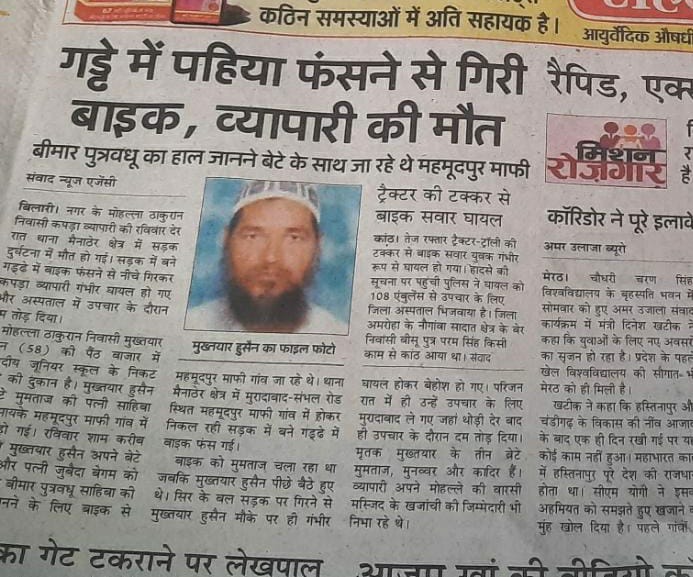
The newspaper clipping Mohammad Suhail was referring to.
“Agar Musalman ka bachcha doctor banna chahe, toh kaise bane? (If a Muslim’s son wants to become a doctor, how will he do it?)” he asks.
Waqi Rasheed, adding to this, points out that there are no central universities in Moradabad, or in adjoining districts Bijnor, Rampur, Amorah and Sambhal. Nor are there central government hospitals.
“When people need surgery or good treatment, they have to travel all the way to Delhi to AIIMS. Workers in the brass industry commonly suffer from tuberculosis, but don’t have access to proper treatment.”
Vinod Kumar, an advocate and SP member, is also a regular at this baithak. He says, “Hindus and Muslims have been divided by the RSS, Bajrang Dal and BJP. Our kids are being misguided, being taught hate.”
He adds, “The language used by Yogi Adityanath is not democratic language, but the language of goons.”
Another person in the gathering barged in to say that the National Security Act (NSA) is being overused by the UP government.
“Recently, UPTET papers were leaked. The chief minister said that the ones who leaked it will be charged with NSA. Is that the correct usage of this act? What about Ajay Mishra, why should NSA not be invoked against him or his son for the Lakhimpur Kheri incident? Or is he safe from such acts because he is part of the BJP system?” he asks.
Twenty-three-year-old Huzaifa Rehman, incharge of the creative art programmes during the anti-CAA protests, interrupts the elders and seeks permission to speak.
He then says, “The generation after 2000 don’t want to believe in hate. Most young people just want quality education and employment opportunities. The focus should be on them before their minds get corrupted.”
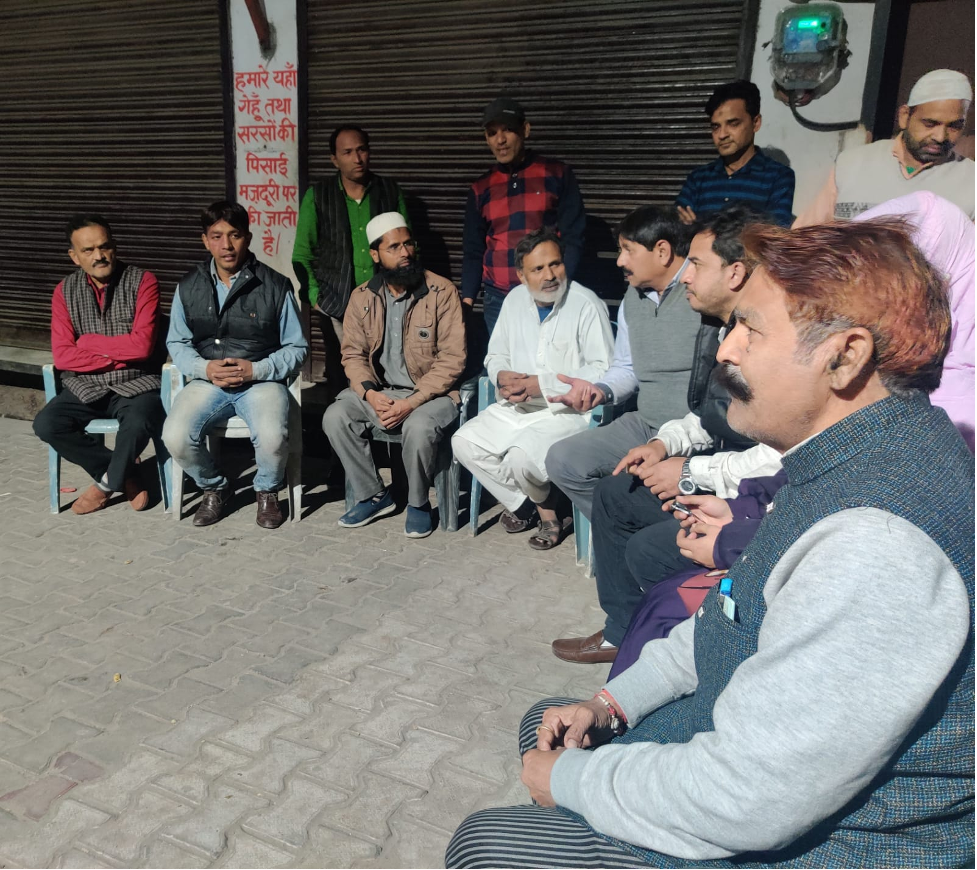
Muslims constitute a considerable number of voters in the district. Photo: Ismat Ara/The Wire
A debate over the electricity bill followed. Some say the bill would be just Rs 200 a decade ago. Others argue that it was Rs 400. But all agree that despite the decline in energy consumption owing to increased awareness, the electricity cost has shot up.
Worries of Muslim women
Next is Ronaq Khan. After referring to the Aadhaar card row and talking about the data that the government may have on citizens, she talks about the increasing fear and insecurity among Muslim women.
“Many women worry for the safety of their daughters because of the rampant sexual harassment in the state. They also worry about their children’s education,” she says.
But increasingly, in recent years, another fear has crept into their hearts, she says. “They worry that their husbands or sons may be harassed by right-wing goons, or even tortured by police. They worry that they may be abruptly picked up from home one day, and be implicated in a false case,” she adds.
This fear has its roots in the anti-CAA protests, she says. “We have all seen the way Muslims men were picked up after the protests across UP, beaten up and tortured. During the time of the protest too, there was fear. People were afraid of becoming the flag bearers of the protests in Moradabad.”
‘Haath jod diye the police ke aage’
Ghanim Miyan, recalling the time when the CAA was passed in parliament, says, “Many cried when CAA was passed and made into a law. When we started the protests, we also started with these baithaks. On the phone, we would tell each other ‘Walime me ajao (Come to the wedding function)’ to avoid leakage of information to the authorities.”
Several people during the protests were served notices and more than 10,000 people were booked by the police. He recalls a conversation he had with the local police along with other elderly members of the society regarding the anti-CAA protests.
He says, “We had folded our hands in front of the police, and requested them to not react in a way that irks people, as people were enraged at the time and anything could have happened.”
As a result, on December 20, Moradabad saw one of the biggest and most peaceful anti-CAA protests with lakhs of protesters, as other protests across the state were either curbed or met with violence, with even deaths being reported.
Rasheed, one of the people who was leading the protests in Moradabad, says that they were constantly in touch with the organisers of the anti-CAA protests in Shaheen Bagh to avoid making any mistakes.
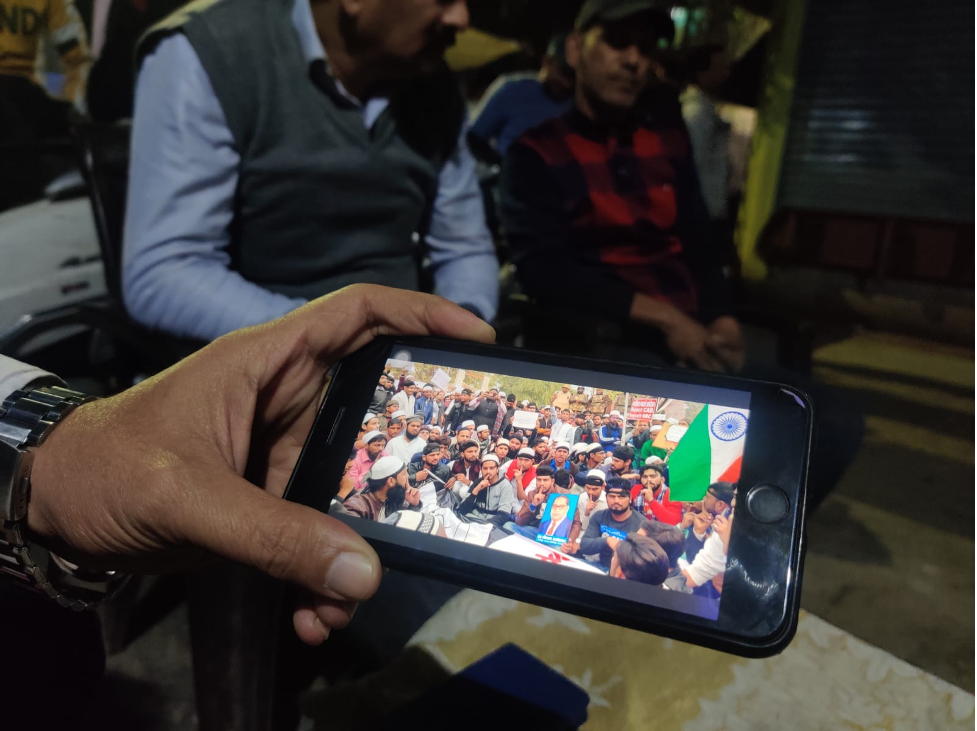
Moradabad saw one of the largest protest gatherings in India against the CAA. Photo: Ismat Ara/The Wire
“The only way to sustain the anti-CAA protests was to emphasise the importance of non-violence. And we managed to keep it completely non-violent,” adds Ghanim Mian.
He then recites a couplet, and signals the end of the baithak for the night. “Na mai gira, aur na toh meri umeedon ke minar gire, par kuch log mujhe girane me kayi baar gire,” he loudly reads.
In 2019, Prime Minister Narendra Modi had used this couplet in his address for political rivals. Ghanim Miyan uses it in a completely different context now, a few months before the UP elections.
Suddenly, the chaiwala interrupts. He asks the group of about 25 men and three women, “Haan magar jeetega kaun? (Yes but who will win the elections?)”
Someone from the gathering says, “We don’t know. But the BJP will lose.”
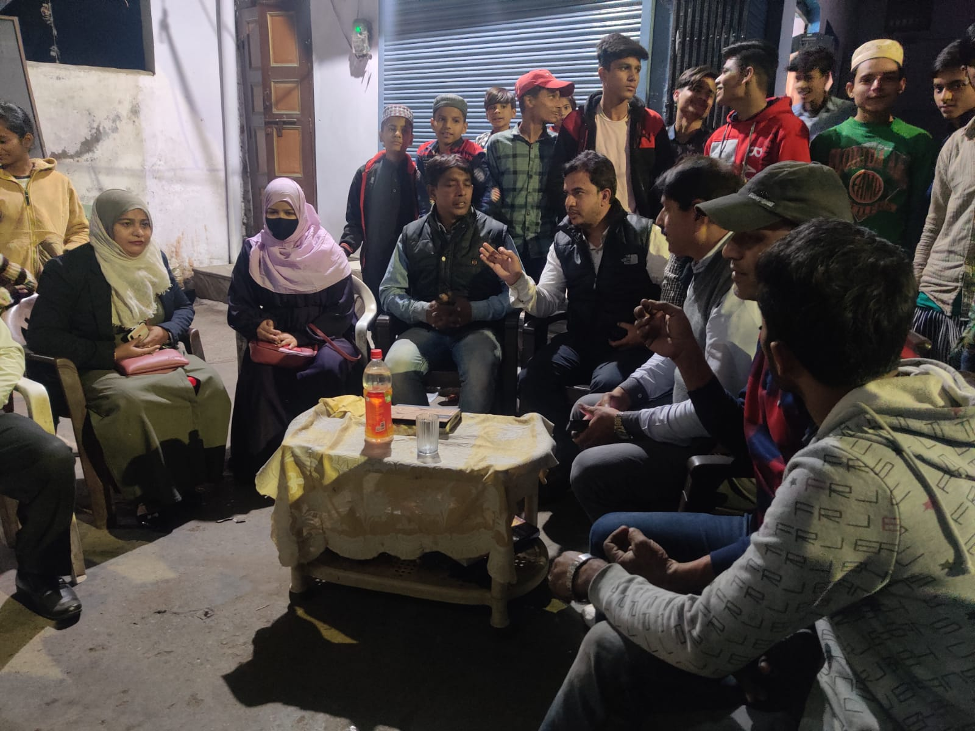
The baithaks evolved out of the anti-CAA protests. Photo: Ismat Ara/The Wire
Twenty-two-year-old Abu Bakar Ansari, a student, adds, “Jo humein hissedaari dega, hum usko vote denge (Whichever party gives us representation, we will vote for them).”





